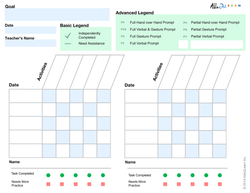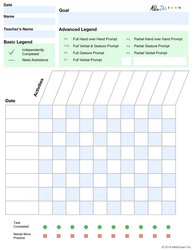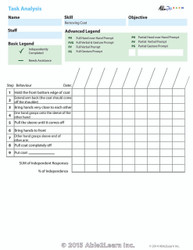Contact
276 Carlaw Ave #200
Toronto, Ontario


This program has 1 Page.
Teaching children with autism how to apologize or why they should apoligize can be difficult at times. Some children may not be able to understand when an apology is warranted. We have created a task analysis data sheet that breaks down the “apology” into understandable increments. This data sheet is meant for recording data. You can add or delete steps as necessary.
The data sheet is customizable as you can add in the “text” you would like your child to say when they see someone is upset. Some examples are: What happened? Why are you upset? What Did I do? Number 5 on the data sheet is also customizable. The immeidiate response is ” I am sorry ” or ” I won’t do it again” Start your child with one two or more words. If your child is non verbal or has speech difficulties visual aids such as pecs, pre made written notes, and apology cards can be used successfully.
If the child is unable to confront the person, it causes extreme anxiety, feels uncomfortable or simply does not understand the situation there are other methods of delayed apology that I feel are just as acceptable. Some delayed forms are an email, skype, letter , hand written note or drawing. The idea is that a sincere apology is made and the child understood his/her actions.
After the apology is made it is important to have a carry through from the other party. Ensure the other party says “Thats okay” or “Were still friends”. I feel having closure will help teach and make the learning a positive experience.
Accompany the data sheet with teaching tools such as visuals, social stories, role playing and IPAD aps to help in the teaching and learning process.
Please share on social media and, leave a review.
With love from our family to yours,

 Quick view
Quick view
Teaching children independent daily living skills is imperative. Studies show independent living for adults with ASD is low with reports indicating that less than 5% live on...
 Quick view
Quick view
This teaching resource has 1 Page Teaching children independent daily living skills is imperative. Studies show independent living for adults with ASD
 Quick view
Quick view
This teaching resource has 1 Page Teaching children independent daily living skills is imperative. Studies show independent living for adults with ASD
 Quick view
Quick view
This teaching resource has 1 Page Teaching children independent daily living skills is imperative. Studies show independent living for adults with ASD
 Quick view
Quick view
This Teaching Resource Has 1 Page Teaching children independent daily living skills is imperative. Studies show independent living for adults with ASD

